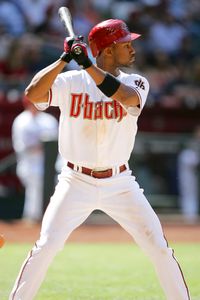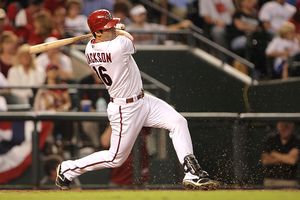
Paul Jasienski/Getty Images
Chris Young is prone to the strikeout, yet he's batting leadoff.
The Diamondbacks, who ranked 14th in the National League with 4.4 runs per game last season, entered the weekend averaging 6.1 -- second only to the Chicago Cubs among major league clubs. They're tied for second in the NL in doubles and rank first in triples and third in home runs. Sure, a little luck might have played into the equation. In their first five games with San Francisco, for example, the Diamondbacks faced Kevin Correia twice and Barry Zito twice. San Diego, in contrast, got a double dose of Tim Lincecum and Matt Cain in its first two series with the Giants.The Diamondbacks are also much more formidable at home, where they're batting .310, than on the road, where they're hitting .246.
That said, you won't have difficulty finding opponents who think the Diamondbacks are for real. The list includes Dodgers manager Joe Torre, whose team dropped four of its first five meetings with Arizona.
"The way they get up there and take their at-bats, you have to be careful with them, because they're hacking," Torre said. "Up and down that lineup, they swing. There's nothing better than a young team that has that confidence. I think they're trying to build on what they did last year."
While general manager Josh Byrnes made a major upgrade to the rotation by trading for pitcher Dan Haren in December, he refrained from acquiring another veteran hitter to help anchor the lineup and provide a security blanket in the event some of the kids floundered.
On the contrary, the Diamondbacks declined to re-sign first baseman Tony Clark, who hit 53 homers as a part-time player the past three seasons and brought a large and very comforting presence to the clubhouse. The team's biggest offensive acquisition was Trot Nixon, who signed a minor league deal in spring training. He's hitting .230 for the Triple-A Tucson Sidewinders. When Melvin describes the lineup as "dysfunctional," he means the individual players are not ideally suited for their roles -- at least at the top of the order.
Chris Young, Arizona's principal leadoff man, is a high strikeout guy with great speed, big power and a .301 career on-base percentage. Eric Byrnes, the second-place hitter, is a first-pitch fastball hitter by nature, and disinclined to eyeball borderline pitches and work deep counts the way a classic No. 2 man should. Orlando Hudson, the No. 3 guy, has averaged 11 homers in five seasons with Toronto and Arizona. Conor Jackson, the cleanup man, hit 15 homers in both 2006 and 2007. He's 25 years old, and hardly a name that springs to mind when you're discussing Manny Ramirez, Alex Rodriguez and the game's pre-eminent 4-hole hitters.
So why are the Diamondbacks demoralizing National League staffs? • A focus on sharing the load: Jackson, Byrnes, right fielder Justin Upton and third baseman Mark Reynolds all rank among the top 10 in the league in multiple offensive categories. And assuming catcher Chris Snyder pulls out of his early funk, it's easy to see every Arizona regular cracking double figures in homers this season.
"We don't have a 40-home run guy, but I think that helps us," Jackson said. "We don't rely on our 3 and 4 hitters to do the job -- we rely on everybody in our lineup. A lot of teams stray away from that now." • A more patient approach: Last year the Diamondbacks ranked ninth in the National League in walks and finished last among the 16 NL clubs with a .321 on-base percentage. This season they're fourth in walks and have a .352 team OBP. Although Torre might regard them as "hackers," they usually wait for a pitch they can handle. [+] Enlarge
Doug Pensinger/Getty Images
Conor Jackson has driven in 19 runs as Arizona's cleanup man.
Even Upton, at 20, has bought into hitting coach Rick Schu's entreaties to refine his two-strike approach and be as selective as possible."It's all about hitting pitches that you can make good contact on," Upton said. "That's one of the things they preach here: control the zone. Know which pitches to hit, and which pitches are strikes." • Maturity: While some teams -- the Dodgers, for instance -- seem hesitant to fully commit to young players, Arizona threw its young players out there and let them fend for themselves a year ago. Shortstop Stephen Drew hit .238, and Young struck out 141 times, but they learned a lot about themselves in the process. Predictably, the Diamondbacks improved as the season progressed. They posted a .716 team on-base-plus-slugging percentage before the All-Star break and a .755 OPS after it, leading Josh Byrnes to believe the progression would carry over into this season.
Jackson took his lumps the past two seasons, but those 900 at-bats he logged gave him considerable insight into what works and what doesn't. He no longer takes his defense to the plate with him, and he's a much calmer presence in the box.
As Schu points out, Jackson is more fluid and able to gather himself rather than rushing into his old "late load" position that made it difficult for him to pull the trigger.
"His whole mechanical setup allows him to be in better position to put balls in play and square them up," Schu said. "He's really able to get on that fastball and drive the ball."
Jackson probably won't hit 25 homers, much less 40, but he has a flair for making contact and finding the gaps. He struck out five times in his first 81 plate appearances. • Flexibility: Although the Arizona lineup has been a monument to stability this season, Melvin has all sorts of Plan B's, C's and D's when the inevitable offensive slowdowns occur. If Young slumps, for example, he might drop to seventh in the order and give way to Drew in the leadoff spot. No Diamondback is more versatile than Eric Byrnes, who has already appeared in each of the first four lineup spots this season. "If we need a Band-Aid, if we're having trouble in the order, he's the guy I go to," Melvin said. "He likes to be the guy who's gonna patch that hole for me wherever it is. If I'm having trouble, I stick him in there." 
Upton
• The phenom: Upton, the first pick in the 2005 draft, is doing his best to justify those Alex Rodriguez and Ken Griffey Jr. comparisons. He's off to a torrid start, even though he had a total of 823 minor league at-bats on his résumé.
"He was the biggest crapshoot, I think, because he didn't have a track record," Jackson said. "We knew that the tools were there. We knew he had the ability. But for him to be doing this at 20 years old, that's pretty impressive." Heck, even Arizona's pitchers can rake. Perennial Cy Young Award candidate Brandon Webb entered the weekend with four RBIs -- more than Andruw Jones, Gary Sheffield, Geoff Jenkins and Mark Grudzielanek, among others. And Micah Owings, who set the Georgia high school home run record before matriculating at Georgia Tech and Tulane, might have a hammerlock on the Silver Slugger Award for the next decade. "He has the most pop on our team in batting practice, no doubt about it," Jackson said. "You watch him, and it's like a high school kid hitting in a Little League field. He might be the best hitting pitcher in baseball history." Upon further review, Jackson takes a slight step back. "Well, there is Babe Ruth," Jackson said, "so I guess you could argue that one." Owings, for his part, blanches in embarrassment when apprised of Jackson's comments.
"I'm not going to go there," he said.
Chances are Owings, like his fellow Diamondbacks, is too busy heading to the batting cage. That's a prerequisite if you want to keep pace with this group.